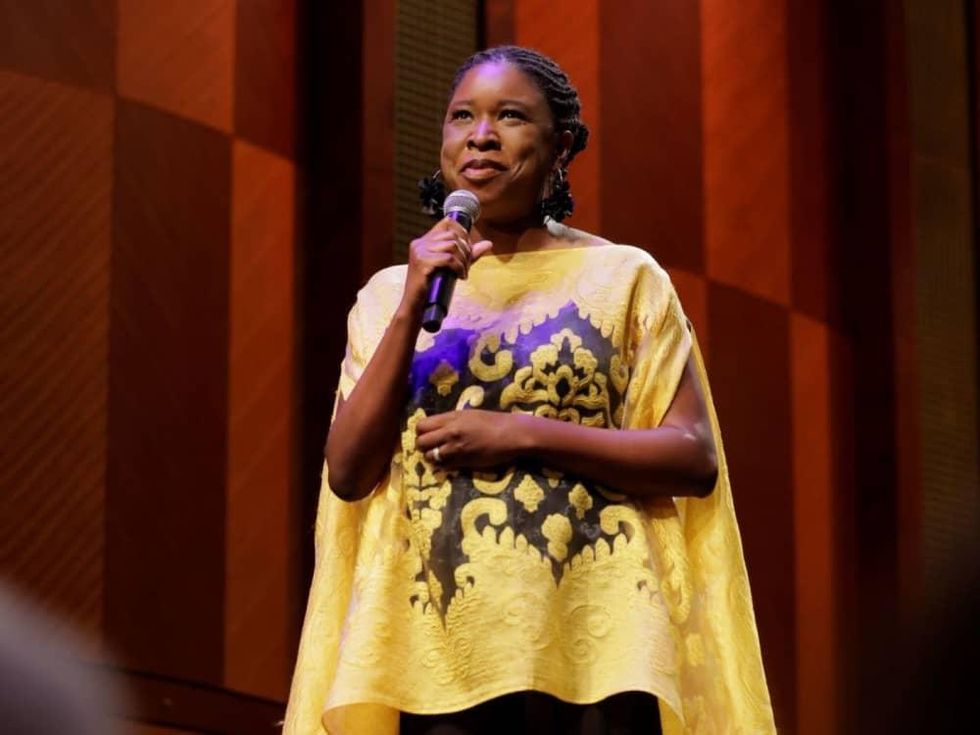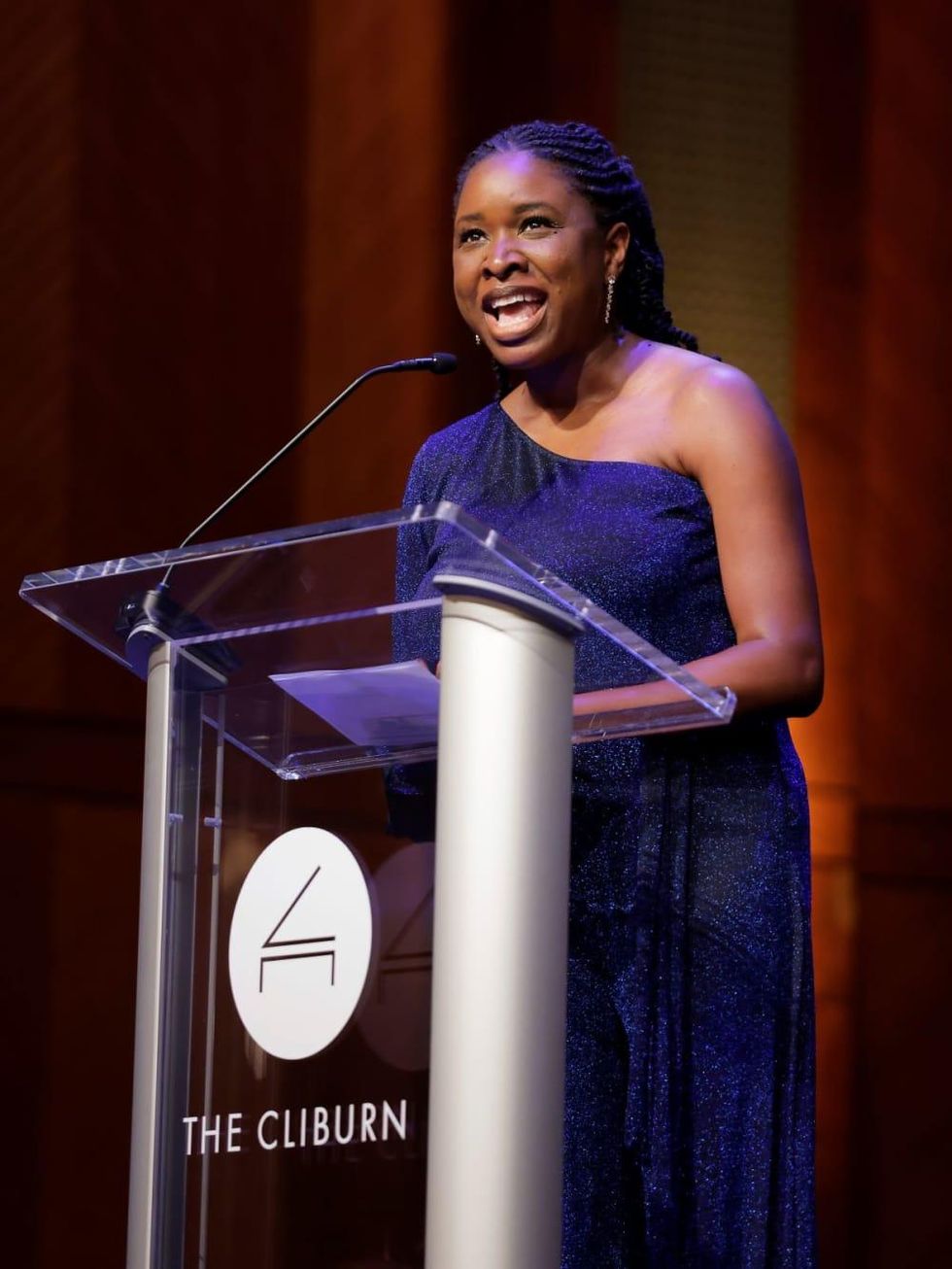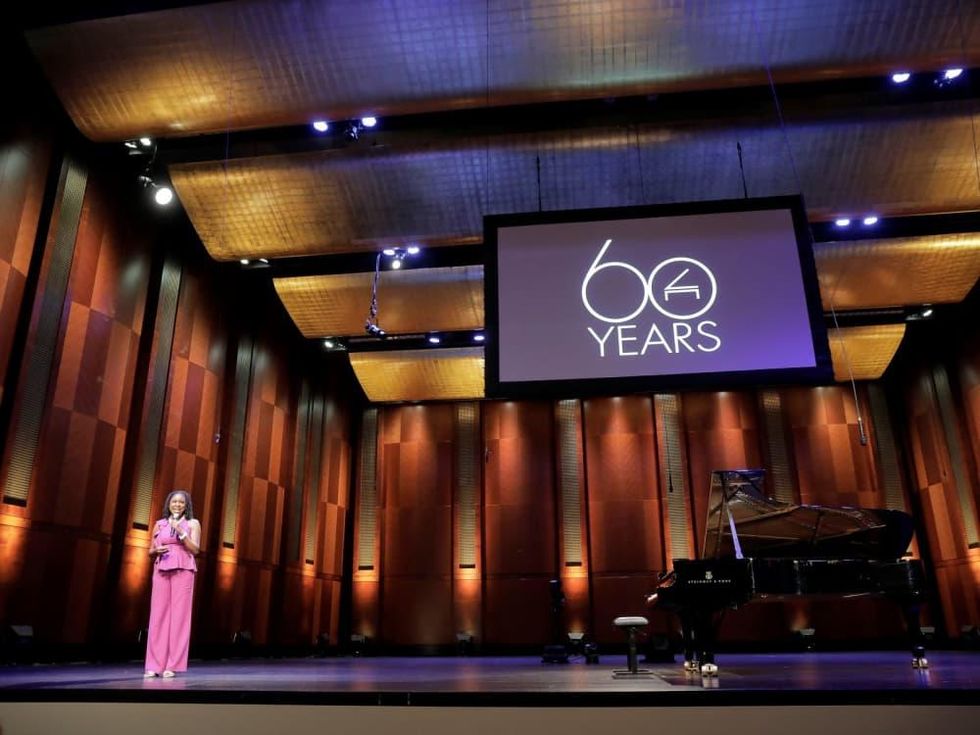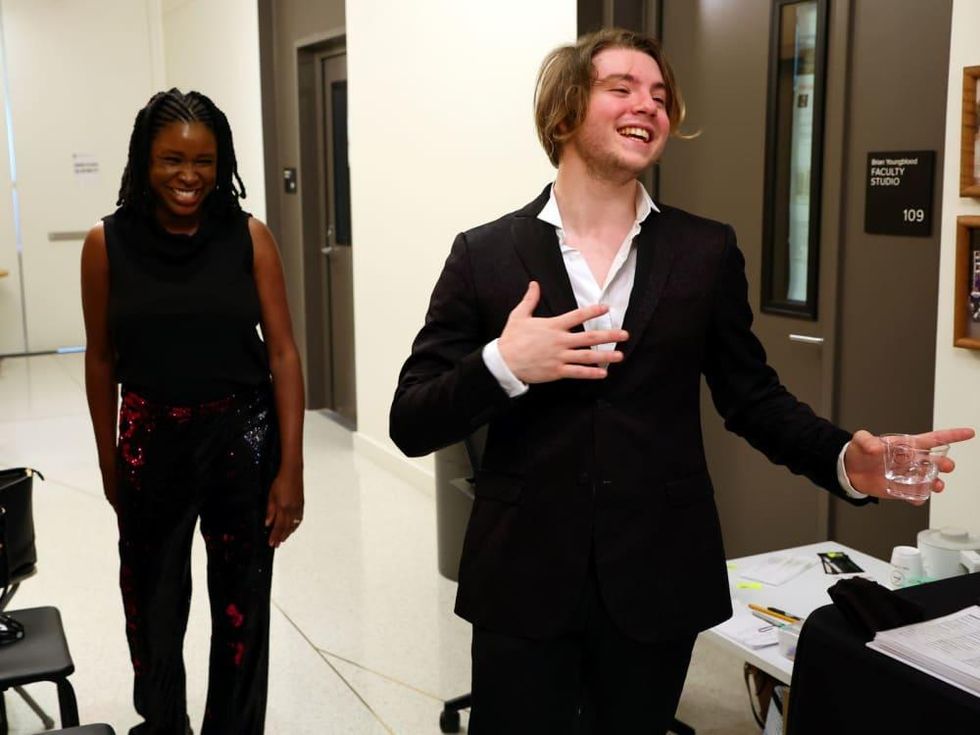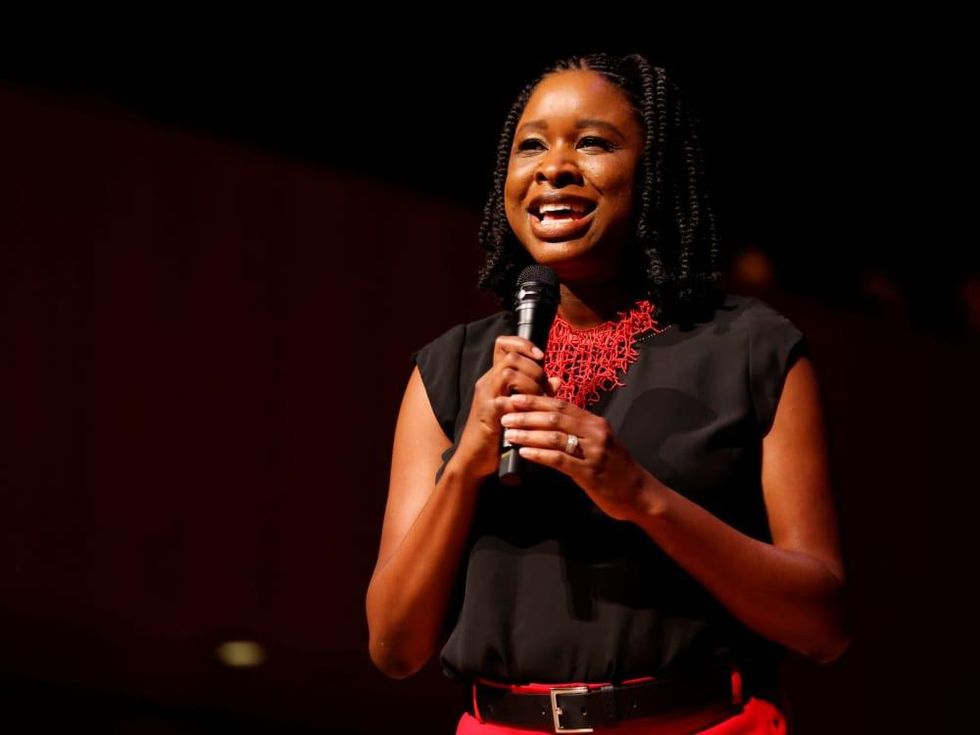Cliburn personalities
Backstage with Artina McCain, the sharp and stylish emcee of the 2022 Cliburn Competition
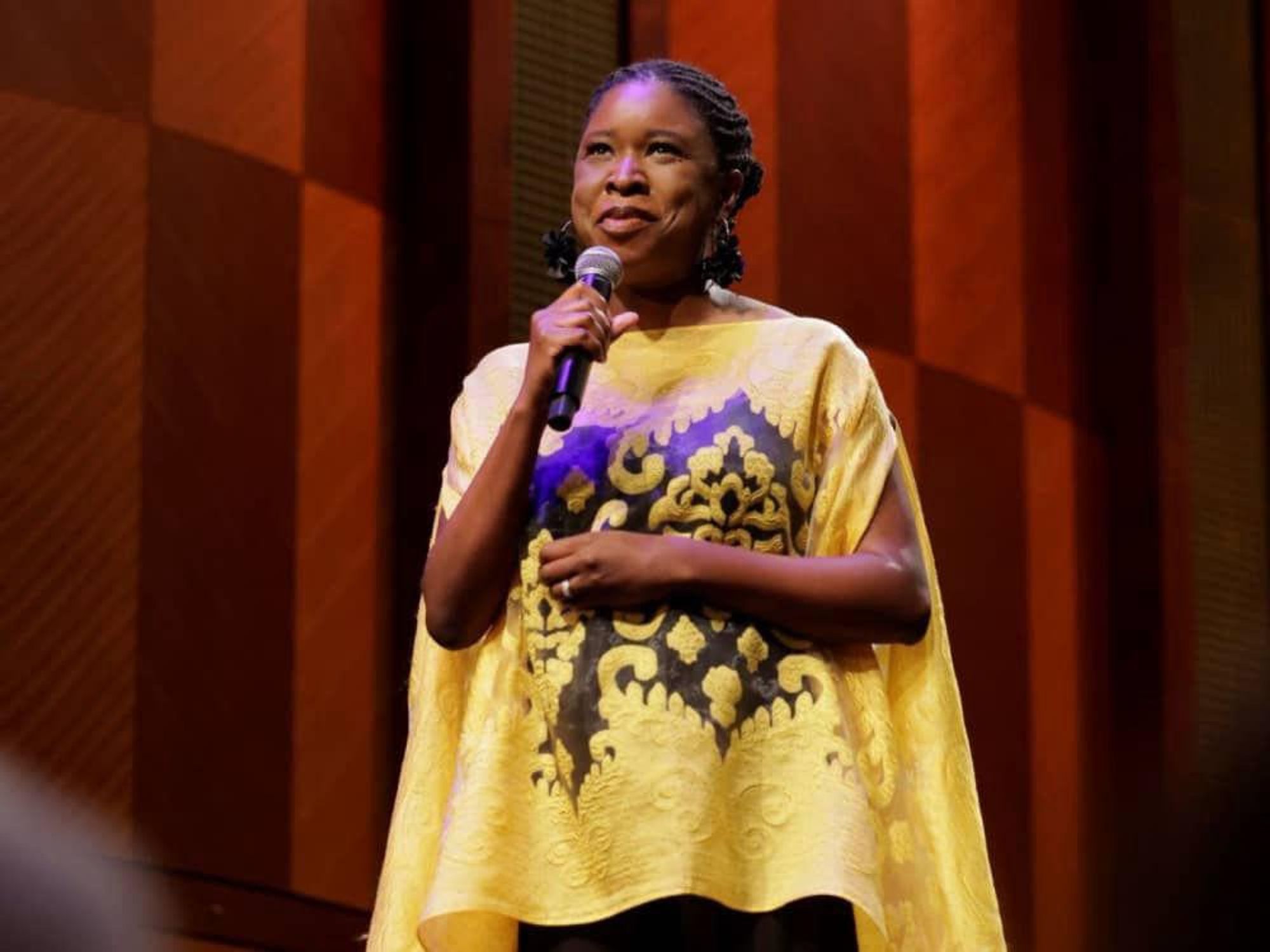
UPDATE 6-18-2022: The Cliburn Competition winners have been announced; find the list here.
---
By the time the Cliburn Competition ends June 18, Artina McCain will have appeared on stage over 100 times — more than all of the competitors, conductors, and piano tuners combined.
As the stage announcer and mistress of ceremonies for the entire 17-day competition in Fort Worth, McCain introduces contestants, announces repertoire, and reminds patrons to silence their cellphones before each concert begins. And, although she only pops on stage for a few seconds at a time, she's become one of the brightest stars of the event.
Since the early days of the competition at the Van Cliburn Concert Hall at TCU and now at Bass Hall, McCain has earned the appreciation of audiences for her affable demeanor, spot-on pronunciations, and — in a fun surprise — her stylish onstage wardrobe.
What audiences are seeing from the seats is genuine: Dr. Artina McCain, herself, is an accomplished concert pianist, professor, clinician, speaker, and author, who is now having the time of her life doing one of the coolest jobs at the Cliburn.
“For me to be a part of it is a real honor,” she says.
‘A different route’
An Arlington native, McCain took her first piano lessons in Grand Prairie, then moved to Orlando, Florida with her family and attended a performing arts magnet school. The dream of a career as a concert pianist pulled her back to Southern Methodist University in Dallas, where she earned a bachelor of arts in piano performance in 2003.
“It was just a great environment. [The professors, including mentor Dr. Carol Leone] were so nurturing and caring, and they were always like, ‘You can do it’ — and look, here I am.”
On paper, her resume from there looks straightforward: a master of music from the Cleveland Institute of Music in 2006, then a doctor of musical arts from the University of Texas at Austin, in 2011. In reality, it was anything but.
In her 20s, McCain suffered an injury that sidelined her from the piano. “I wasn’t able to play for six years,” she says. “Physically, I was not able to play because of pain, for many reasons.”
Through an alternative practice called Muscle Activation Techniques, McCain restored her body and trained herself to play in new ways.
“If you have an injury, a lot of times, it can be career ending so you can’t compete or play,” she says. “After about six years of not playing, I’ve had now almost a decade of a really great performing career.”
Because of her own experiences, McCain now advocates for musicians’ wellness, often writing and presenting on the topic at conservatories, universities, and major music conferences.
“I have a great career now as a pianist,” she says, “but in a different route.”
McCain currently calls Memphis, Tennessee home, where she is an associate professor of piano and coordinator of keyboard area at the University of Memphis, as well as co-founder and director of the Memphis International Piano Festival and Competition.
While she keeps a full teaching schedule, she also performs on big stages and regularly collaborates with one special musician in particular — her husband. Together, Artina and Martin McCain are The McCain Duo — she on piano, and he on bass trombone. (“He also went to UT Austin — Go, Longhorns!” she adds.)
She will be jetting away from the Cliburn for one "off" day during the finals, in fact, for a McCain Duo concert in Orlando. She’ll fly back for her emcee duties the next day. “Just a quick day trip,” she says. “The life of a musician, right?”
Substance, style, and more substance
The Cliburn approached McCain about emceeing the competition last fall after being impressed with a “Cliburn Kids” online presentation she was involved in, recalls artistic director Sandra Doan.
McCain eagerly took on the new challenge, starting with learning competitors’ name pronunciations and looking through the repertoire. “I’ve taught or played about 70 percent of it," she says, "so it’s not that foreign to me.”
Her biggest challenge? Learning how to pronounce the titles of French pieces. “I have had friends and a French colleague, Anne-Cécille Rouiller, backstage. She helps me with the French pronunciations literally right before I go on the stage,” she says.
But the one development that McCain did not expect was that she would become a competition style star. From colorful dresses and separates, to a chic off-the-shoulder jumpsuit, and even a pair of pink and black sequin pants that an Italian competitor coveted, her fashionable looks have become part of her onstage ethos.
”Now when I come out in the lobby," she says, "people are commenting on what day they liked, and I’m like, ‘Oh my goodness — pressure.’”
A self-admitted shopping addict, she’s been doing a bit of retail therapy on Fort Worth to mix new items with her own clothes with some rented wardrobe pieces. The pressure is now on to glam up for the final round, she joked.
“I’m gonna do a big crescendo right to the end,” she teases.
When the competition ends, McCain will go home to Memphis and see where life takes her next.
One of her passions is championing Black and other underrepresented composers and musicians. She curates such concerts for arts organizations, has won awards for her own solo recordings of them, and, six months ago, Hal Leonard published her arrangements of African American Folk Songs for burgeoning piano students.
“I think our music communities can always benefit from diversity in many ways — ethnic diversity, gender diversity — something I didn’t see so much of when I was younger and probably still,” she says. “I’m really passionate about performing works by those composers, letting people know what those are, and in this case writing a book for the little ones so that they can start sooner than I did in knowing that there’s a lot of great music and art out there that deserves to be heard in all stages.”
McCain strives to be the same kind of role model and teacher to other young pianists that she remembers fondly from her days at SMU. “I think mentorship’s really important, and having people believe in you even when you don’t know what you can be,” she says.
Her own career has taught her to stay open to every opportunity, she says, even if it means learning French.
“I like doing a lot of things, so I kind of like how my career has taken shape where I get to teach and perform and now, emcee — another line on the resume."
